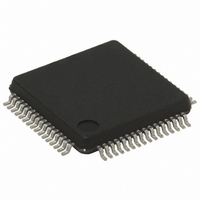ST72F561R9TA STMicroelectronics, ST72F561R9TA Datasheet - Page 41

ST72F561R9TA
Manufacturer Part Number
ST72F561R9TA
Description
IC MCU 8BIT 60K FLASH 64-LQFP
Manufacturer
STMicroelectronics
Series
ST7r
Datasheet
1.ST72F561K6T6.pdf
(265 pages)
Specifications of ST72F561R9TA
Core Processor
ST7
Core Size
8-Bit
Speed
8MHz
Connectivity
CAN, LINSCI, SPI
Peripherals
LVD, POR, PWM, WDT
Number Of I /o
48
Program Memory Size
60KB (60K x 8)
Program Memory Type
FLASH
Ram Size
2K x 8
Voltage - Supply (vcc/vdd)
3.8 V ~ 5.5 V
Data Converters
A/D 16x10b
Oscillator Type
External
Operating Temperature
-40°C ~ 85°C
Package / Case
64-LQFP
For Use With
497-8374 - BOARD DEVELOPMENT FOR ST72F561
Lead Free Status / RoHS Status
Lead free / RoHS Compliant
Eeprom Size
-
Available stocks
Company
Part Number
Manufacturer
Quantity
Price
Company:
Part Number:
ST72F561R9TA
Manufacturer:
STMicroelectronics
Quantity:
10 000
Company:
Part Number:
ST72F561R9TATR
Manufacturer:
STMicroelectronics
Quantity:
10 000
- Current page: 41 of 265
- Download datasheet (10Mb)
POWER SAVING MODES (Cont’d)
Halt Mode Recommendations
– Make sure that an external event is available to
– When using an external interrupt to wake up the
– For the same reason, reinitialize the level sensi-
– The opcode for the HALT instruction is 0x8E. To
– As the HALT instruction clears the interrupt mask
wake up the microcontroller from Halt mode.
microcontroller, reinitialize the corresponding I/O
as “Input Pull-up with Interrupt” before executing
the HALT instruction. The main reason for this is
that the I/O may be wrongly configured due to ex-
ternal interference or by an unforeseen logical
condition.
tiveness of each external interrupt as a precau-
tionary measure.
avoid an unexpected HALT instruction due to a
program counter failure, it is advised to clear all
occurrences of the data value 0x8E from memo-
ry. For example, avoid defining a constant in
ROM with the value 0x8E.
in the CC register to allow interrupts, the user
may choose to clear all pending interrupt bits be-
fore executing the HALT instruction. This avoids
entering other peripheral interrupt routines after
executing the external interrupt routine corre-
sponding to the wake-up event (reset or external
interrupt).
8.5 ACTIVE HALT MODE
ACTIVE HALT mode is the lowest power con-
sumption mode of the MCU with a real time clock
available. It is entered by executing the ‘HALT’ in-
struction when MCC/RTC interrupt enable flag
(OIE bit in MCCSR register) is set and when the
AWUEN bit in the AWUCSR register is cleared
(See “Register Description” on page
The MCU can exit ACTIVE HALT mode on recep-
tion of the RTC interrupt and some specific inter-
rupts (see
34) or a RESET. When exiting ACTIVE HALT
mode by means of a RESET a 4096 or 256 CPU
cycle delay occurs (depending on the option byte).
After the start up delay, the CPU resumes opera-
tion by servicing the interrupt or by fetching the re-
set vector which woke it up (see
When entering ACTIVE HALT mode, the I[1:0] bits
in the CC register are are forced to ‘10b’ to enable
interrupts. Therefore, if an interrupt is pending, the
MCU wakes up immediately.
In ACTIVE HALT mode, only the main oscillator
and its associated counter (MCC/RTC) are run-
ning to keep a wake-up time base. All other periph-
erals are not clocked except those which get their
clock supply from another clock generator (such
as external or auxiliary oscillator).
The safeguard against staying locked in ACTIVE
HALT mode is provided by the oscillator interrupt.
Note: As soon as active halt is enabled, executing
a HALT instruction while the Watchdog is active
does not generate a RESET.
This means that the device cannot spend more
than a defined delay in this power saving mode.
MCCSR
OIE bit
0
1
HALT mode
ACTIVE HALT mode
Power Saving Mode entered when HALT
Table 9, “Interrupt Mapping,” on page
instruction is executed
Figure
45.)
ST72561
28).
41/265
Related parts for ST72F561R9TA
Image
Part Number
Description
Manufacturer
Datasheet
Request
R

Part Number:
Description:
STMicroelectronics [RIPPLE-CARRY BINARY COUNTER/DIVIDERS]
Manufacturer:
STMicroelectronics
Datasheet:

Part Number:
Description:
STMicroelectronics [LIQUID-CRYSTAL DISPLAY DRIVERS]
Manufacturer:
STMicroelectronics
Datasheet:

Part Number:
Description:
BOARD EVAL FOR MEMS SENSORS
Manufacturer:
STMicroelectronics
Datasheet:

Part Number:
Description:
NPN TRANSISTOR POWER MODULE
Manufacturer:
STMicroelectronics
Datasheet:

Part Number:
Description:
TURBOSWITCH ULTRA-FAST HIGH VOLTAGE DIODE
Manufacturer:
STMicroelectronics
Datasheet:

Part Number:
Description:
Manufacturer:
STMicroelectronics
Datasheet:

Part Number:
Description:
DIODE / SCR MODULE
Manufacturer:
STMicroelectronics
Datasheet:

Part Number:
Description:
DIODE / SCR MODULE
Manufacturer:
STMicroelectronics
Datasheet:

Part Number:
Description:
Search -----> STE16N100
Manufacturer:
STMicroelectronics
Datasheet:

Part Number:
Description:
Search ---> STE53NA50
Manufacturer:
STMicroelectronics
Datasheet:

Part Number:
Description:
NPN Transistor Power Module
Manufacturer:
STMicroelectronics
Datasheet:

Part Number:
Description:
DIODE / SCR MODULE
Manufacturer:
STMicroelectronics
Datasheet:











